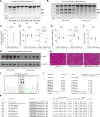In Vivo Base Editing of PCSK9 (Proprotein Convertase Subtilisin/Kexin Type 9) as a Therapeutic Alternative to Genome Editing
- PMID: 28751571
- PMCID: PMC5570639
- DOI: 10.1161/ATVBAHA.117.309881
In Vivo Base Editing of PCSK9 (Proprotein Convertase Subtilisin/Kexin Type 9) as a Therapeutic Alternative to Genome Editing
Abstract
Objective: High-efficiency genome editing to disrupt therapeutic target genes, such as PCSK9 (proprotein convertase subtilisin/kexin type 9), has been demonstrated in preclinical animal models, but there are safety concerns because of the unpredictable nature of cellular repair of double-strand breaks, as well as off-target mutagenesis. Moreover, precise knock-in of specific nucleotide changes-whether to introduce or to correct gene mutations-has proven to be inefficient in nonproliferating cells in vivo. Base editors comprising CRISPR-Cas9 (clustered regularly interspaced short palindromic repeats [CRISPR]-CRISPR-associated 9) fused to a cytosine deaminase domain can effect the alteration of cytosine bases to thymine bases in genomic DNA in a sequence-specific fashion, without the need for double-strand DNA breaks. The efficacy of base editing has not been established in vivo. The goal of this study was to assess whether in vivo base editing could be used to modify the mouse Pcsk9 gene in a sequence-specific fashion in the liver in adult mice.
Approach and results: We screened base editors for activity in cultured cells, including human-induced pluripotent stem cells. We then delivered a base editor into the livers of adult mice to assess whether it could introduce site-specific nonsense mutations into the Pcsk9 gene. In adult mice, this resulted in substantially reduced plasma PCSK9 protein levels (>50%), as well as reduced plasma cholesterol levels (≈30%). There was no evidence of off-target mutagenesis, either cytosine-to-thymine edits or indels.
Conclusions: These results demonstrate the ability to precisely introduce therapeutically relevant nucleotide variants into the genome in somatic tissues in adult mammals, as well as highlighting a potentially safer alternative to therapeutic genome editing.
Keywords: PCSK9; gene therapy; lipids and lipoprotein metabolism; molecular biology; nucleotides.
© 2017 American Heart Association, Inc.
Figures





References
Publication types
MeSH terms
Substances
Grants and funding
LinkOut - more resources
Full Text Sources
Other Literature Sources
Medical
Research Materials
Miscellaneous

